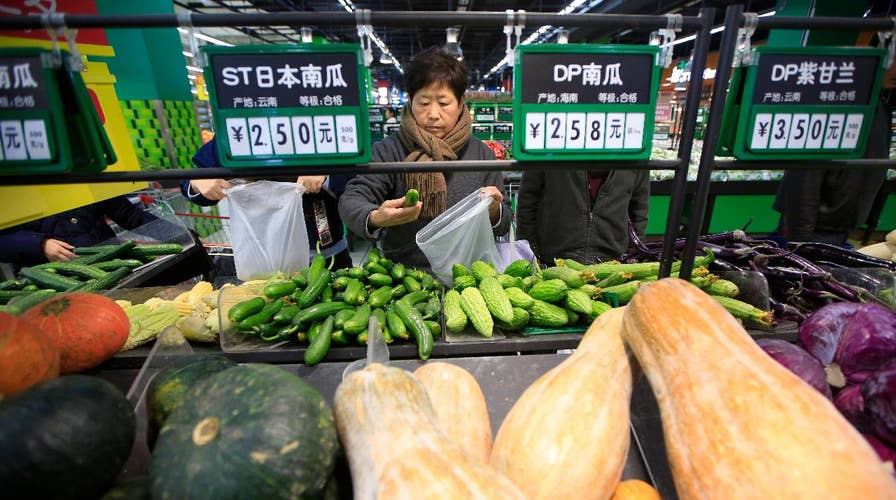China retaliates to Trump tariffs
Fox Business Network's Deirdre Bolton on Beijing's face-saving response.
The Trump administration said Tuesday that it plans to slap 25-percent tariffs on approximately 1,300 products from China in response to Beijing's alleged theft of U.S. intellectual property.
According to the U.S. Trade Representative's office, the mainly non-consumer products account for approximately $50 billion in annual imports. The items include industrial chemicals, motorcycles and medical devices.
However, the proposed tariffs would not take effect before a public comment period ends May 11.
The announcement comes 11 days after Trump levied "protective" tariffs on Chinese steel and aluminum in response to what the administration has described as unfair trade practices.
In response, China raised import duties on American pork, fruit, aluminum and other products. China's government said earlier its imports of those goods last year totaled $3 billion.
The latest sanctions are designed to punish China for using strong-arm tactics in its drive to become a global technology power, including pressuring American companies to share technology in exchange for access to the Chinese market, forcing U.S. firms to license their technology in China on unfavorable terms and even hacking into U.S. companies' computers to steal trade secrets.
The administration sought to draw up the list in a way that limits the impact of the tariffs -- a tax on imports -- on American consumers while hitting Chinese imports that benefit from Beijing's sharp-elbowed tech policies.
As part of its complaint, the U.S. is bringing a WTO case against Chinese licensing policies that put U.S. companies at a disadvantage.
Sen. Lindsey Graham, R-S.C., praised the announcement in a statement, saying: "Nothing will ever change when it comes to China’s business practices until somebody starts pushing back.
"It is not too much to ask for China to stop stealing intellectual property and open up their markets that are closed due to heavy-handed Chinese government barriers to foreign business enterprises," Graham said.
The Chinese embassy in Washington said it "strongly condemns" the planned tariffs, which it said "serves neither China's interest, not the U.S. interest, even less the interest of the global economy."
"As the Chinese saying goes, it is only polite to reciprocate," added the embassy, which said Beijing would seek relief from the World Trade Organization (WTO) and "take corresponding measures of equal scale and strength against U.S. products in accordance with Chinese law."
Even representatives of the tech industry, which has complained for years that China has pilfered U.S. technology and discriminated against U.S. companies, were critical of the administration's latest action.
"Unilateral tariffs may do more harm than good and do little to address the problems in China's (intellectual property) and tech transfer policies," said John Frisbie, president of the U.S.-China Business Council.
And the Internet Association, which represents such companies such as Google, Facebook and Amazon, expressed concerns, too.
"There's no doubt the U.S. government can and should address China's trade practices," Melika Carroll, the association's senior vice president of global government affairs. "But consumers and American job creators should not be caught in the crossfire. ... These tariffs will leave our customers worse off, stifle growth and make it harder for the digital economy to succeed."
The National Association of Manufacturers (NAM), said that the tariffs "are likely to create new challenges in the form of significant added costs for manufacturers and American consumers [and] run the risk of provoking China to take further destructive actions against American manufacturing workers."
"If the imposition of tariffs is the first bid in negotiating a more level playing field," NAM President and CEO Jay Timmons said in a statement. "... the end product must be a new, strategic approach that includes negotiating a fair, binding and enforceable rules-based trade agreement with China that requires them to end their unfair trade practices once and for all."
In January, a federal court in Wisconsin convicted a Chinese manufacturer of wind turbines, Sinovel Wind Group, of stealing trade secrets from the American company AMSC and nearly putting it out of business. And in 2014, a Pennsylvania grand jury indicted five officers in the Chinese People's Liberation Army on charges of hacking into the computers of Westinghouse, US Steel and other major American companies to steal information that would benefit their Chinese competitors.
The Associated Press contributed to this report.





